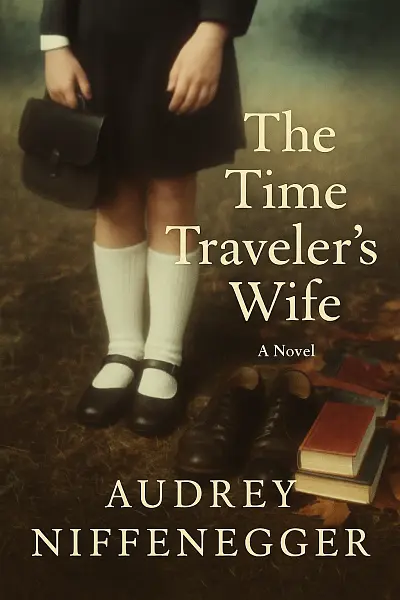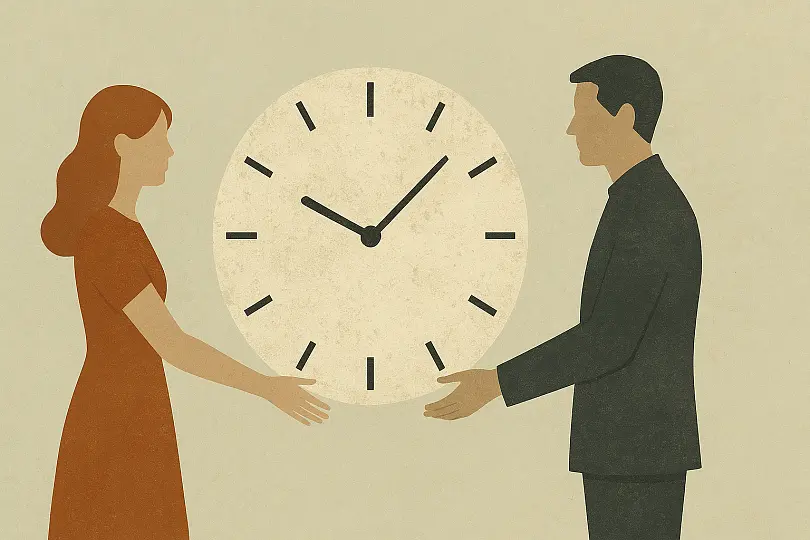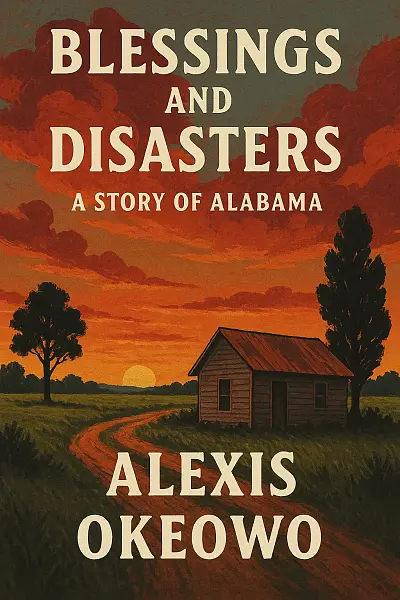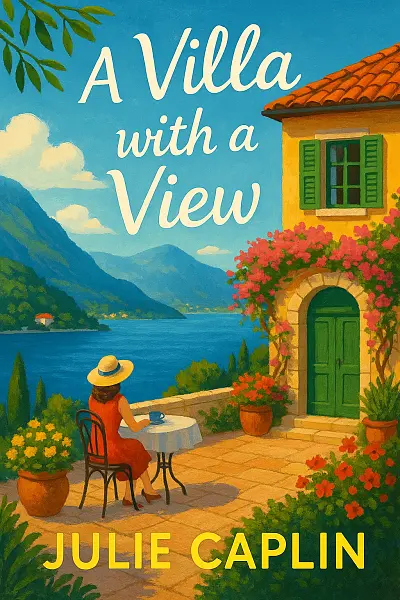
The Time Traveler's Wife
Clare grows up in a quiet Chicago suburb, shaped by the bewildering visits of Henry, a man out of sync with time itself. Their connection sparks early, but everything changes when Clare discovers that Henry's uncontrollable journeys through past and future make any hope of a "normal" life nearly impossible.
Now adults, the spark becomes romance, but loving someone who can vanish without warning means both are always bracing for heartbreak. Their devotion is tested by the unpredictable forces tearing them apart, leaving their happiness constantly at risk.
Told with dreamy intimacy, the story pulls you in—will they or won’t they find a way to love through time’s wild chaos?
""Love persists across the shifting tides of time, not by holding on to every moment, but by letting our hearts remember what endures when everything else slips away.""
Let's Break This Down
The Author's Voice
Atmosphere:
Dreamily bittersweet, sometimes haunting, always intimate. Niffenegger conjures a world that feels both magical and tactile, weaving together nostalgic Chicago backdrops and cozy domestic details with the dizzying, uncertain thrill of time travel. The mood dances gracefully between aching romance and looming melancholy, holding heartbreak and hope in a delicate balance. Expect a sense of longing threaded through even the most quotidian moments.
Prose Style:
Lush, lyrical, yet utterly approachable. The writing flows with a poetic cadence, ornamented with vivid metaphor and striking turns of phrase, but never strays into overwrought territory. Dialogue feels real and warm, grounding the more fantastical elements. Scenes are painted with sensory detail—you’ll practically smell the rain on concrete or feel the chill of Chicago winters—making the extraordinary feel believable. Chapters alternate narrators, giving a raw, confessional tone that pulls you close.
Pacing:
Synchronously slow-burning and urgent. The novel meanders at times, lingering over everyday life, rich memories, and emotional minutiae. This introspective rhythm lets you luxuriate in the development of Clare and Henry’s relationship. Yet, time travel’s unpredictability injects bursts of tension and suspense—the narrative leaps and loops, sometimes leaving you searching for your temporal footing, but rarely losing its forward thrust. Don’t expect a straight sprint; this is a lyrical wander with dazzling flashes of velocity.
Characterization:
Profoundly intimate and multifaceted. Characters are written with a generous empathy—their flaws vivid, their inner lives complex and believable. Henry and Clare feel alive, their pain and joy palpable, while side characters are sketched with warmth and individuality. Emotional authenticity reigns here; you’ll root for the lovers even as you ache for the inevitability of their hardships.
Emotional Tone:
Simultaneously swoony and gutting. Love, grief, yearning, and acceptance all pulse through the writing. You’ll find yourself hopelessly invested in a romance that feels as much mythic as it is mundane, bracing for heartbreak while savoring glimpses of transcendence. Grab some tissues—the emotional impact lingers long after the final page.
Narrative Complexity:
Nonlinear, inventive, and immersive. The book demands a bit of readerly attention, hopping through time with numbered timestamps and dual perspectives. But it’s well-rewarded: the interwoven timelines enhance both suspense and emotional depth, letting you see characters through both present and future eyes. There’s a satisfying puzzle-piece element as the narrative gradually fills in its own blanks.
Overall Feel:
A gorgeously strange love letter to fate and choice, wrapped in moody, evocative prose. Prepare for pensive afternoons and late-night page turns, swept up in a story that’s as much about the wobbles of time as the constancy of love.
Key Moments
-
Clare’s childhood tea parties with her mysterious, vanishing friend—Henry's visits that bend age and time
-
Love letters scrawled across decades, longing pulsing through every stolen reunion
-
Threading fate through timelines: Henry’s desperate attempts to change tragic inevitabilities
-
Pages tinged with loss: the gut punch of Clare’s loneliness as years stretch between arrivals
-
That heart-stopping library “meet-cute”—when past and future collide, and nothing is certain
-
Niffenegger’s prose dances between science fiction and yearning romance, making heartbreak feel inevitable and intimate
-
Final pages that shatter and heal at the same time—reminding us that love is both anchor and release
Plot Summary
The Time Traveler’s Wife centers around Henry DeTamble, a librarian who involuntarily travels through time, and his wife Clare Abshire, whose life unfolds linearly but is repeatedly marked by Henry’s unpredictable disappearances. From her childhood, Clare is visited by different-aged versions of Henry, fostering a love burdened with longing and waiting. As they attempt to build a life together, Henry’s affliction strains their marriage, especially as they struggle with infertility and the fears of his potential absence. The plot culminates in Henry’s tragic death, which occurs after a final, violent time jump, leaving Clare to raise their daughter Alba, who has inherited Henry’s condition. In the novel’s bittersweet resolution, Clare ultimately waits into old age for one last visit from Henry, sealing the story with themes of enduring love and loss.
Character Analysis
Henry is a complex, troubled protagonist shaped by the trauma of his mother’s early death and the uncontrollable nature of his time travel, which forces him into roles both protector and victim. Over time, he grapples with fear, guilt, and determination to provide Clare with stability. Clare, meanwhile, grows from an idealistic child to a resilient, fiercely devoted woman; her arc is defined by her ability to accept uncertainty, mastering patience and hope despite recurrent heartbreak. Secondary characters like Gomez, Charisse, and Ingrid add further depth, revealing both the strain and support friendship provides in extraordinary circumstances. The evolution of Henry and Clare’s relationship is both poignant and painful, making their emotional journeys utterly compelling.
Major Themes
Unquestionably, love and time are at the forefront—Niffenegger examines how love can stretch and persevere even through the fragmentation of time, as Henry and Clare’s connection survives the impossible. The novel explores fate versus free will, questioning the extent to which one’s destiny is predetermined, especially as Henry’s knowledge of future tragedies complicates his choices. Loss and waiting shape every interaction, with Clare’s life defined by anticipation and grief, while Henry’s is saturated with helplessness and fear. Issues of identity—how we are shaped by absence, trauma, and connection—are woven throughout, using time travel as a metaphor for the unpredictability and impermanence of life.
Literary Techniques & Style
Audrey Niffenegger’s writing melds lyrical prose with a sharp, unvarnished honesty, lending the novel both dreamlike romance and emotional grit. The dual first-person narrative, switching perspectives between Clare and Henry, deepens readers’ investment and highlights their parallel struggles. Clever use of chronological dislocation—disjointed timelines, past and future versions of characters interacting—mirrors the instability experienced by the protagonists and keeps readers engaged with the puzzle of their lives. Symbolism runs strong: the titular time travel represents the unpredictability inherent in love and loss, and recurring metaphors like waiting and absence underscore the ache of their story.
Historical/Cultural Context
Set mainly in Chicago from the 1970s through early 2000s, the novel spans decades of cultural change yet mostly remains focused on private, domestic spaces rather than broader social issues. Themes of family, scientific advancement, and ideas about fate touch on cultural anxieties about technology and existentialism, but the main context is emotional and relational. The story was first published in 2003, resonating with readers in a post-9/11 era when uncertainty and longing for connection felt particularly poignant.
Critical Significance & Impact
The Time Traveler’s Wife rapidly became a contemporary classic—applauded for its imaginative premise, emotional honesty, and genre-blending of science fiction with literary romance. While some critics find its melodrama overwrought or question the plausibility of its romantic dynamics, most agree the novel achieves a rare balance of heartfelt sincerity and philosophical inquiry. Its ongoing popularity, multiple adaptations, and influence on subsequent time-travel romances underline its lasting relevance—especially for readers hungry for nuanced, bittersweet love stories.

Love untethered by time—an impossible romance shaped by fate’s unpredictability
What Readers Are Saying
Right for You If
If you’re a sucker for sweeping love stories with a twist of sci-fi, The Time Traveler's Wife is pretty much calling your name. Seriously, if you enjoy books that take your heart on a rollercoaster but also make you think—especially about fate, time, and all the messy parts of being human—you’re in the right place.
Who’s gonna love this?
- Hopeless romantics: If you get goosebumps from love letters, stolen glances, and the ache of “meant to be, but it’s complicated,” this is your jam.
- Time travel & genre-blenders: People who like a little sci-fi in their fiction (not spaceships and lasers, more like timey-wimey twists on everyday life) will find this book totally satisfying.
- Fans of literary fiction: The writing style is lush and emotional, with tons of attention to detail. If you dig a story that takes its time and lets you marinate in the characters’ emotions, you’re set.
- Anyone craving a tearjerker: Not gonna lie, this one will probably wreck you a bit. If you love books that linger long after you finish the last page, you’ll be hooked.
But maybe skip it if...
- You need fast pacing or action: The story meanders and focuses a lot on feelings and the characters’ inner lives. If you get impatient without big plot twists or high-octane drama, it might drive you nuts.
- You want straightforward storytelling: The timeline jumps all over the place, so if nonlinear narratives or piecing together a puzzle stresses you out, this might not be your thing.
- Romance isn’t your thing: If you roll your eyes at intense, sometimes melodramatic relationships, or you’re looking for hard sci-fi, you’ll probably want to look elsewhere.
Bottom line: If you love books where the love story messes with your heart (and maybe your head), and don’t mind a bit of genre-bending, The Time Traveler’s Wife is worth a spot on your shelf. But if you’re all about plot-heavy, straightforward reads, or just not in the mood for a tragic romance, this one might not be your cup of tea.
What You're Getting Into
Imagine falling in love with someone whose life is never on the same timeline as yours—literally!
The Time Traveler’s Wife follows the extraordinary romance between Henry, a man involuntarily pulled through time, and Clare, the artist who loves him with unwavering patience. With its blend of heartache, hope, and a dash of sci-fi magic, this novel is a moving exploration of fate, longing, and how love endures even when time itself refuses to cooperate.
Characters You'll Meet
-
Henry DeTamble: The charming, troubled librarian with a genetic condition that causes him to time travel unpredictably. His struggle to find stability and maintain his relationship with Clare forms the emotional core of the story.
-
Clare Abshire: Artistic and fiercely devoted, Clare is Henry’s anchor throughout his temporal disarray. Her life is shaped by waiting for Henry, and her journey explores themes of love, patience, and sacrifice.
-
Gomez: Clare’s loyal friend and eventual brother-in-law, Gomez harbors complex feelings for her but ultimately supports Clare and Henry through their trials.
-
Charisse: Clare’s warm, supportive best friend and Gomez’s wife. Charisse grounds the group, balancing the chaos of Henry’s time travel with pragmatic compassion.
-
Alba DeTamble: The daughter of Henry and Clare, Alba inherits her father’s time-traveling ability. Her presence adds new emotional stakes and offers hope for the future despite her challenging legacy.
More Like This
If you found yourself enchanted by the emotional depth and time-bending love story in Outlander by Diana Gabaldon, you’ll probably be just as swept away by The Time Traveler’s Wife. Both novels deliver an irresistibly poignant romance, but where Outlander transports its heroine through the Scottish Highlands, Niffenegger’s novel explores the heartache and wonder of unpredictable time leaps within a single relationship, intensifying the ache of every reunion and goodbye.
Fans of Eternal Sunshine of the Spotless Mind will sense a similar bittersweet resonance in Niffenegger’s narrative. Both the novel and the film unpack how love persists—and sometimes falters—when memory, time, and fate become unreliable, intertwining heartbreak with hope in ways that linger long after the final page or credits roll. There’s that unmistakable ache and elation of two souls trying desperately to stay connected in a reality forever pulling them apart.
Meanwhile, readers who adored The Night Circus by Erin Morgenstern will recognize the lyrical, almost haunting prose and meticulously crafted atmosphere woven into The Time Traveler’s Wife. Both stories paint love as an act of magic and resilience, enveloping you in worlds where reality shimmers at the edges, and connection feels both fragile and extraordinary.
Critic's Corner
Is love still love when time itself conspires against you? The Time Traveler’s Wife asks whether intimacy can survive when one partner is constantly disappearing into the inescapable past or uncertain future. Audrey Niffenegger dares us to ponder if shared memory—or the lack thereof—might bind us more powerfully than mere chronology, and whether fate or choice ultimately shapes a relationship’s destiny.
Niffenegger’s writing shimmers with emotional clarity and inventive structure. Told in alternating perspectives between Clare and Henry, the narrative moves back and forth in time without ever becoming confusing. She skillfully uses first-person voices to contrast Henry’s existential disorientation with Clare’s poignant longing, immersing us in their interior lives. Dialogues ring true, marked by wry humor and understated heartbreak. Her prose is direct, lyrical when needed, but never distractingly ornate, allowing the wild premise to feel grounded. The author’s grasp of pacing is impressive—she achieves a delicate balance, giving space to small domestic moments and sudden, jolting leaps across years. Occasionally, the non-linear format risks repetitive beats, but overall, Niffenegger’s narrative control maintains both clarity and momentum.
At its core, this novel is a meditation on the limits and possibilities of human connection. Issues of fate versus free will, the agony of anticipation, and the uneven distribution of time in relationships all pulse through the novel’s veins. Clare’s life—structured around Henry’s unpredictability—becomes a study in attachment, patience, and yearning, a commentary on how lovers endure the absences that inevitably fracture even the closest bonds. Niffenegger also weaves in questions about memory: is our essence defined by the sequence of lived events, or by the intensity with which we remember and are remembered? In today’s restless, time-strapped culture, the story’s brave confrontation of waiting, loss, and aging feels especially resonant—offering comfort and challenge to a generation obsessed with instantaneity.
Within the speculative romance tradition, The Time Traveler’s Wife is a beguiling hybrid—part literary fiction, part science fiction, part timeless love story. It invites comparison to classic time-travel tales like Vonnegut’s Slaughterhouse-Five or the fateful love of Outlander, but carves its own space by letting emotional realism take precedence over science. Readers of Matt Haig or Kate Atkinson will recognize the intricate, character-first approach to temporal disruption—but Niffenegger’s dual-POV intimacy gives her novel a distinctive vulnerability.
No novel with such ambition is flawless. Sometimes, supporting characters feel underdrawn, or the plot’s emotional peaks tip into melodrama. Yet, the heart of Clare and Henry’s bond is so achingly authentic, it anchors even the book’s occasional missteps.
For those craving a reading experience that’s both intellectually alive and emotionally raw, The Time Traveler’s Wife remains a modern classic—a rare tale that lingers in memory long after the last page is turned.
Community Thoughts
Clare just lingers in my mind! Her patience is wild, almost painful. Every time Henry vanished, I kept holding my breath for her. I didn’t expect to care so much about someone’s waiting.
honestly, clare’s heartbreak just sneaks up on you and BOOM, suddenly you’re wide awake at 3 am wondering if love can ever really survive time. this book broke my routine and my heart.
couldn't stop thinking about henry disappearing mid-conversation, honestly made me double-check my own reality. the whole concept scrambled my brain all night, sleep was not an option after that.
that scene where clare waits at the window, just aching with hope and dread, hit me like a truck. time isn’t the enemy, it’s the thief hiding in plain sight. i can’t shake her loneliness.
I honestly woke up thinking about Clare and couldn't shake her all day. Her patience, her longing, her stubborn hope, it's like she crawled right under my skin and just stayed there, refusing to be ignored.
Leave Your Review
Local Take
Why It Matters
The Time Traveler’s Wife strikes a powerful chord with readers here, especially because of its deep dive into the tricky dance between fate and personal agency.
-
Parallel historical experiences: Time’s unpredictability can echo periods of rapid social and political change in our history—think of decades when families were split by migration, war, or cultural shifts. The novel’s tender exploration of longing and separation mirrors generations’ own stories of loving across distances and uncertain futures.
-
Cultural values: The intense loyalty between Clare and Henry aligns with our cultural emphasis on enduring relationships and sacrificing for loved ones. Yet, the novel’s individualistic lean—characters forging odd, isolating paths—sometimes jars against the communal spirit and collective identity prized locally.
-
Resonance of plot points: Loss and waiting, so vividly drawn, feel visceral for readers familiar with separation, whether by circumstance or tradition. But the open treatment of sexuality and fate as uncontrollable may challenge more conservative sensibilities.
-
Literary traditions: The blend of magical realism and romantic tragedy channels beloved local authors who blend the surreal with raw human emotion, but Niffenegger’s unpredictable structure and nonlinear time narrative shake up familiar storytelling rhythms, making it feel both fresh and unsettling.
Honestly, it's a book that intrigues, unsettles, and touches—in perfect sync and discord with local tastes.
Food for Thought
Controversies around The Time Traveler's Wife:
- Some readers and critics have raised concerns about the depiction of the central relationship, debating whether it romanticizes problematic power dynamics due to Clare meeting Henry as a child.
- There's also ongoing discussion about the portrayal of female agency and consent, with arguments that certain elements of the love story feel unsettling or imbalanced within the context of time travel.
Like what you see? Share it with other readers







